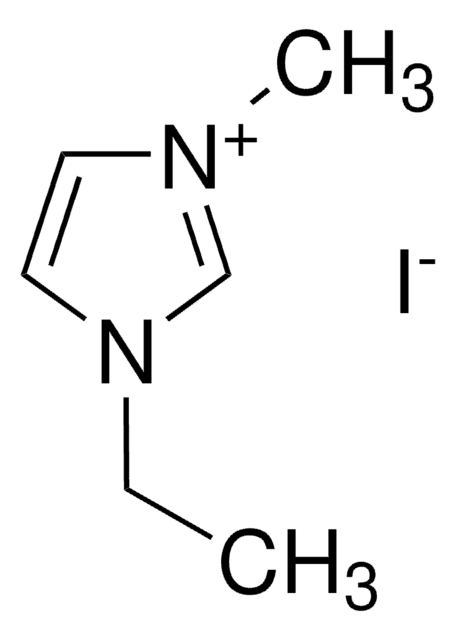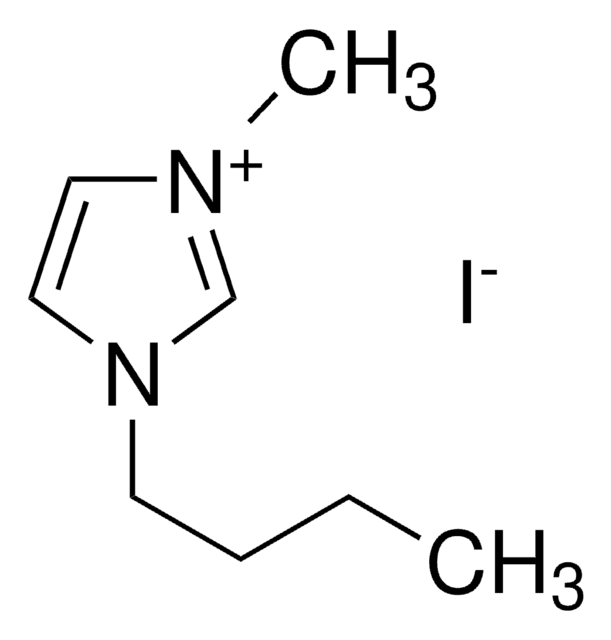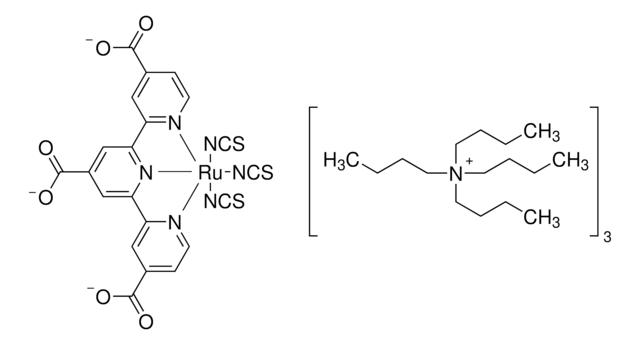791555
Titania paste, active opaque
Sinonimo/i:
Greatcell Solar® 18NR-AO Titania Paste, TiO2 paste
About This Item
Prodotti consigliati
Descrizione
Crystal Structure: > 99% anatase (analysis carried out on starting material, prior to paste manufacture)
Livello qualitativo
Forma fisica
paste (cream)
Concentrazione
27.0 wt. %
Dimens. media delle particelle
20 nm (active)
≤450 nm (scatter)
Viscosità
40000-55000 mPa.s(20 °C) (Analysis carried out with 20mm 4 degree cone/plate; 40 s-1))
InChI
1S/2O.Ti
GWEVSGVZZGPLCZ-UHFFFAOYSA-N
Descrizione generale
Applicazioni
The dispersed scattering particles in Active Opaque Titania Paste formulation lead to enhanced DSC performance through the large surface/volume ratio of the sintered film.
Active Opaque Titania Paste has a blend of active anatase particles (~20nm) and larger anatase scatter particles (up to 450nm).
After drying; this paste must be fired at or above 500°C. This results in an opaque sintered layer with film thickness of 7-8μm for one printed layer and ~15μm for two layers; when using a 48T mesh.
This paste exhibits optimal rheological properties that provide good surface uniformity and contain organic binders specially formulated to provide versatile porosity suitable for a range of dye/electrolyte systems.
Storage: Store in the dark at 20°C
Note legali
Greatcell Solar® is a registered trademark of Greatcell Solar
Avvertenze
Warning
Indicazioni di pericolo
Consigli di prudenza
Classi di pericolo
Eye Irrit. 2 - Skin Irrit. 2
Codice della classe di stoccaggio
10 - Combustible liquids
Classe di pericolosità dell'acqua (WGK)
WGK 1
Punto d’infiammabilità (°F)
195.8 °F
Punto d’infiammabilità (°C)
91 °C
Scegli una delle versioni più recenti:
Possiedi già questo prodotto?
I documenti relativi ai prodotti acquistati recentemente sono disponibili nell’Archivio dei documenti.
I clienti hanno visto anche
Articoli
Professor Shinar (Iowa State University, USA) summarizes the developments of a variety of sensor configurations based on organic and hybrid electronics, as low-cost, disposable, non-invasive, wearable bioelectronics for healthcare.
Few Monolayer Atomic Layer Deposition (ALD) on Surfaces and Interfaces for Energy Applications
Dye-sensitized solar cells (DSCs) are 3rd generation solar cells combining the promise of high efficiency with low production costs.
Organic photovoltaics (OPVs) represent a low-cost, lightweight, and scalable alternative to conventional solar cells. While significant progress has been made in the development of conventional bulk heterojunction cells, new approaches are required to achieve the performance and stability necessary to enable commercially successful OPVs.
Il team dei nostri ricercatori vanta grande esperienza in tutte le aree della ricerca quali Life Science, scienza dei materiali, sintesi chimica, cromatografia, discipline analitiche, ecc..
Contatta l'Assistenza Tecnica.





![Spiro[9H-fluorene-9,9′-[9H]xanthene]-2,2′,7,7′-tetramine](/deepweb/assets/sigmaaldrich/product/structures/225/593/3b5858b3-0993-43eb-97ee-3f0d2a1142dc/640/3b5858b3-0993-43eb-97ee-3f0d2a1142dc.png)

